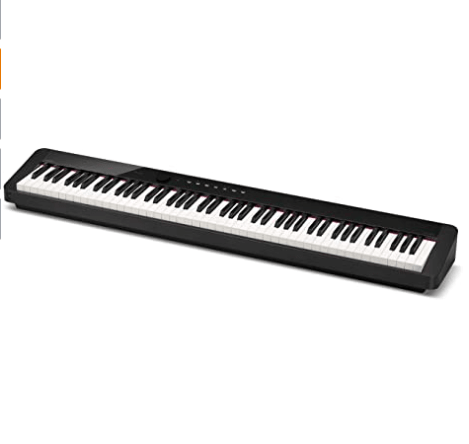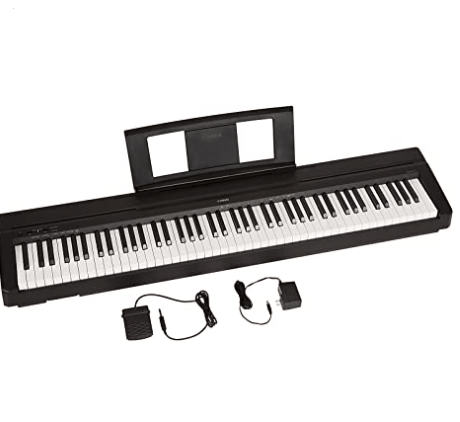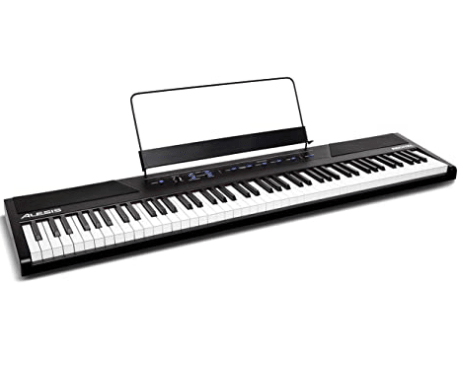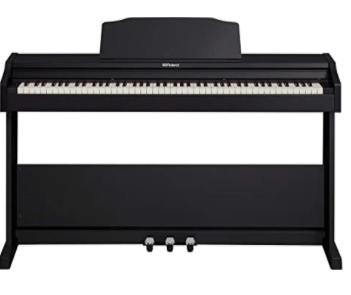Digital Piano Vs. Electric Keyboard - What's The Difference?
A Guide to Price, Sound, Action, Size, Durability, and More
You’ve just taken your first piano lesson, and your first assignment is to buy a piano.
Chances are your piano teacher really wants you to buy an acoustic baby grand piano, but, let’s be real. Those instruments can be expensive!
If you’re looking for a cost-effective piano for your home, you’ve probably looked into electric piano keyboards and digital pianos - but what’s the difference? Are digital pianos and keyboards the same thing? Well, not exactly.
Should You Buy a “Starter Piano”?
First off, there is no such thing as a starter piano. It doesn’t exist. The only instrument to buy is an instrument that you get excited to play. Don’t sell yourself short just to save a few now and save up for later. The only starter piano or digital keyboard piano is the one that sounds, feels and looks like a concert level piano.
The Differences Between an Electronic Keyboard and Digital Piano
People often interchange the two terms digital piano and electronic keyboard, but the terms have different definitions. In short:
An electronic keyboard is an instrument with black and white keys that produces sound from previously recorded electronic sounds that resemble a piano (or other instruments). When you press a key, the instrument uses electric signals to create a sound through the speakers (like a synthesize).
A digital piano is an electronic keyboard that resembles an acoustic piano by sound and appearance - the sound is created via sampling of high end acoustic pianos (so the sound is much nicer than an electronic keyboard).
What’s An Electric Keyboard?
An electric keyboard is probably the cheapest option on the table, and they are often light, portable, and come with a variety of instrumental sounds, computer hookups, and maybe a stand. They don’t have a piano cabinet (so they don’t look like a piano), and they occupy the least amount of space. You can even put them on a table if you so choose.
Higher end electric pianos might be referred to as a “stage piano,” and popular makes would include a Korg or Roland electric piano.
The keys won’t always be weighted if you buy an electric piano, so the feel won’t replicate that of a real piano - the sound will usually be pretty “electric” as well. Lastly, you’ll want to make sure you get an electric keyboard with 88 keys if you plan to use it to play piano music.
Some solid options to choose from:
Casio Privia Electric Keyboard
The Casio Privia has weighted, hammer-action keys, so the feel will translate to a real piano. The sound is rich as well - so you’ll enjoy hearing yourself play. Additionally, the Casio Privia has 88 keys. The numerous voicings and back-tracks are fun to mess around with, and it has a refined, contemporary look.
YAMAHA P71 88-Key Piano Keyboard
Yamaha is always a reliable brand, and this keyboard has weighted keys, lots of voices and bells and whistles, and a great sound. It’s portable and also has a music stand. It comes with a pedal as well.
Alesis 88 Key Electric Keyboard
Alesis may not have the name recognition of Yamaha or Casio pianos, but this is an affordable, reliable option for a beginning pianist. It has voicing and Midi functionality, weighted keys, and a piano-like sound, and it can be a good stepping stone as you decide whether or not to buy a higher end keyboard.
What’s a Digital Piano?
Digital pianos are intended to replicate the look, feel, and sound of an acoustic piano. They are cheaper, lighter, and smaller than acoustic pianos though, and you can still enjoy a good piano playing experience.
To read about hybrids, see our digital hybrid piano guide.
Digital pianos will often not have as many voices and technical specs as an electric piano, but they aren’t intended for stage and recording use, at least not to the same extent. They are intended for serious piano practice (or even performances), and they will also provide a nice visual accent to your home.
A digital piano will include a piano cabinet, attached pedals (as opposed to the detachable pedal that comes with electric keyboards), and often a realistic piano bench. Digital pianos almost always have 88 keys, as they are intended for use with serious piano repertoire.
Some options:
The Yamaha Clavinova
The Clavinova is, of course, the premiere digital piano on the market, and for good reason. They have unmatched sound quality, touch, and looks, and they changed the game when they entered the scene in 1983. You can choose from digital consoles from around $2,500, or you can invest in a spectacular CLP digital grand piano model for around $7,000. The keys have authentic grand piano action, and the sound sampling is high end.
Yamaha P125 Digital Piano
For a cheaper Yamaha product, you can try this solid digital piano option. It features 88 weighted keys, a wooden cabinet, realistic music stand, Yamaha acoustic grand piano sound sampling, and compact, sleek look.
Also look into the Yamaha Arius - As a genre, they are probably the best all-round keyboards in overall performance, size, and price. The full console gives a refined look to your digital keyboard so that you may still want to display it for guests to see as well and not just stashed in a closet for practicing.
Casio PX860 BK Privia Digital Home Piano
This may be the best bang for your buck - Casio digital pianos really are a pleasure to play, and you’ll enjoy practicing on this compact digital model. The 88 keys are full-sized, have weighted action, and it features a rich tone. Piano cabinet and pedal console are included.
Roland 88 Key Digital Piano
This is a solid option with weighted keys, an 88-key keyboard, bluetooth, and a nice sound. Roland is mainly known for their stage pianos, but this is an excellent choice for your home.
Lagrima Digital Piano
The Lagrima 88 key digital piano is a popular option among beginner pianists, and it can be an excellent gateway into the Clavinova brand if you aren’t sure if you’re into piano for the long haul. It has Midi and USB functionality, a full pedal set, a nice looking cabinet, and other features for under $400. It doesn’t specify that the keys are weighted though, so if you want a realistic feel, you’ll need to look elsewhere.
Specific Things To Look For In a Digital Piano Or Electric Keyboard
So when choosing a digital keyboard piano, you want to find an instrument that closely resembles the real deal – an acoustic grand piano. There are a few things to consider when choosing your instrument. You want the right sound quality, size, touch, structure, and of course, price! So here’s a rundown on what to look for when choosing a digital keyboard.
Keyboard Size
Digital keyboards come in all sizes, but to get the most out of your instrument, you want to look for a full-size keyboard that has 88 keys, since that’s the size of a traditional grand piano. All the greatest music was written on full size pianos, whether written by Mozart, Ray Charles, or Billy Joel. They all wrote their music for the real thing, so if you try to play any of their pieces on a shorter digital keyboard piano with less than 88 keys, you’re selling yourself short. Honestly you won’t get the full value out of your playing or piano lessons.
Touch
Touch refers to two things: the resistance felt when the key is pushed down and the response in sound the instrument gives when the hammer hits the strings. When searching for the best digital keyboard piano, you’ll encounter the term weighted-action keys, which refers to touch. The best acoustic grand pianos are highly sensitive to the touch so that the slower you depress the key, the quieter the sound, and the faster you depress the key, the louder the sound. Many and almost all full size digital keyboards come with weighted keys, but it’s important to double check that your digital keyboard includes this spec.
Sound Quality
The grand piano creates sound with the vibrations from the strings when they’re hit with the hammer. You want nothing less than the same sound, and many manufacturers offer digital keyboard pianos with this quality of sound. You want to look for a high number of polyphony. Polyphony means many voices, so the more voices the instrument is capable of sustaining, the more realistic the sound is to a concert piano. So if you’re wanting to play any of LIszt’s rhapsodies, none of the notes will be left out or cut off.
Structure/Pedals
Every high end piano has 3 pedals: the damper, the sostenuto, and the una corda; and they each have a specific purpose. The damper pedal allows all the strings to vibrate with the ones being struck by the hammers, so it “blurs” the sounds. The sostenuto does the same thing but only for the particular keys you strike. (It’s most often used for bass notes, so that it frees your hands to play other notes.) The una corda softens the sound across the board by shifting the hammers so they hit only one string instead of all three. To get the most out of your digital keyboard piano, you want one that has all three pedals, but if that’s not in your price range, there are some portable keyboards that have plugins for pedals, so be sure to have at least the damper, since it’s used most often.
Honestly the best way to know you’ve found the best digital keyboard piano is testing grand pianos and various digital keyboard pianos back to back. Comparing the digital ones to the acoustic is the best way to know you’ve found your instrument.
Price
The price varies by manufacturer and by the specs included. We know it’s a big sum of money up front, but please trust us on this. We’ve bought musical instruments that we thought would be good “starter” instruments and never were we satisfied. It’s better to sacrifice a little now to gain huge rewards afterward. That being said, this is our personal list of the best digital pianos out there.
Our Top Three Manufacturers: Yamaha, Roland, and Casio
Our top three brand recommendations are Yamaha, Roland, and Casio, respectively. I’ve played and taught on all three brands, and highly recommend you look at these when choosing your digital piano keyboard.
Yamaha Clavinova, Arius, and Portable Grands Series
Let’s first take a look at what Yamaha has to offer. The brand has a variety of digital piano keyboard series. The Clavinova series looks and feels like an acoustic upright piano but is actually digital. The Arius series looks like a digital keyboard but comes with a full console, so it looks a little more formal. The Portable Grands series is exactly as it sounds. The series is a variety of full-size digital keyboards that you can travel with.
Roland Grand Pianos, Premium Uprights, and Uprights
Roland is known for their advanced digital keyboard technology. Since 1973 they have been at the forefront of digital keyboard technology. Now they offer various grand piano and upright designs to fit your specific need.
Casio Digital Keyboards
Casio was founded in the mid 20th century, and the Japanese brand has produced some of the best digital keyboard instruments since. They produce excellent sound quality for a comfortable price.
Which Should You Buy? An Electric Keyboard Or Digital Piano?
If you are taking lessons and practicing every day, we would recommend that you purchase a digital piano (preferably a Yamaha, Casio, or Roland) with high end sound sampling and weighted key action. If you are using your keyboard for recording, writing tunes, or just messing around, a portable electric keyboard is great.
If you are a gigging musician who needs an electric stage piano for live shows, certainly purchase a Korg or Roland stage piano - they are worth the money.
Is a 61-Key Electric Keyboard Worth It?
If you are a pianist or working to become one, no - do not buy a 61 key piano. It’s worth spending a bit more for the full range of keys.
However, if you use your keyboard casually for pop tunes, improvisation, learning notes, producing music, or something like that (or if you carry it around to gigs and you only need a limited range), then a 61 key electric piano is absolutely fine.
One last note...
Please be ready to allot some money to accessories that are necessary. We can’t stress enough how important it is to buy a good piano bench. You want a bench with adjustable height, because correct posture improves your playing and keeps you healthy - We’re not exaggerating!
If you’re interested in piano lessons at our main studio in Philadelphia, live online piano lessons, or Philadelphia piano moving services, please don’t hesitate to reach out - we would be happy to work with you in person or online.







